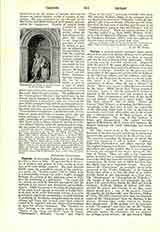

Tatian, a second-century apologist about whose antecedents and early history nothing can be affirmed with certainty except that he was born in Assyria and that he was trained in Greek philosophy. While a young man he traveled extensively. Disgusted with the greed of the pagan philosophers with whom he came in contact, he conceived a profound contempt for their teachings. Repelled by the grossness and immorality of the pagans and attracted by the holiness of the Christian religion and the sublimity and simplicity of the Scriptures, he became a convert, probably about A.D. 150. He joined the Christian community in Rome, where he was a “hearer” of Justin. There is no reason to think he was converted by the latter. While Justin lived Tatian remained orthodox. Later (c. 172) he apostatized, became a Gnostic of the Encratite sect, and returned to the Orient. The circumstances and date of his death are not known. Tatian wrote many works. Only two have survived. One of these, “Oratio ad Graecos” (Pros Hell?nas), is an apology for Christianity, containing in the first part (i—xxxi) an exposition of the Christian Faith with a view to showing its superiority over Greek philosophy, and in the second part a demonstration of the high antiquity of the Christian religion. The tone of this apology is bitter and denunciatory. The author inveighs against Hellenism in all its forms and expresses the deepest contempt for Greek philosophy and Greek manners.
The other extant work is the “Diatesseron”, a harmony of the four Gospels containing in continuous narrative the principal events in the life of Our Lord. The question regarding the language in which this work was composed is still in dispute. Lightfoot, Hilgenfeld, Bardenhewer, and others contend that the original language was Syriac. Harnack, Burkitt, and others are equally positive that it was composed in Greek and translated into Syriac during the life-time of Tatian. There are only a few fragments extant in Syriac but a comparatively full reconstruction of the whole has been effected from St. Ephraem’s commentary, the Syriac text of which has been lost, but which exists in an Armenian version. Two revisions of the “Diatesseron” are available: one in Latin preserved in the “Codex Fuldensis” of the Gospels dating from about A.D. 545, the other in an Arabic version found in two manuscripts of a later date. The “Diatesseron” or “Evangelion da Mehallete” (the Gospel of the mixed) was practically the only gospel text used in Syria during the third and fourth centuries. Rabbula, Bishop of Edessa (411-435), ordered the priests and deacons to see that every church should have a copy of the separate Gospels (Evangelion da Mepharreshe), and Theodoret, Bishop of Cyrus (423-457), removed more than two hundred copies of the “Diatesseron” from the churches in his diocese. Several other works written by Tatian have disappeared. In his apology (xvv) he mentions a work “on animals” and (xvi) one on the “nature of demons”. Another work in refutation of the calumnies against the Christians (xl) was planned but perhaps never written. He also wrote a “Book of Problems” (Eus., “Hist. Eccl.”, V, 13), dealing with the difficulties in the Scriptures, and one “On Perfection according to the Precepts of Our Savior” (Clem. Alex., “Strom.”, III, 12, 81).
PATRICK J. HEALY

